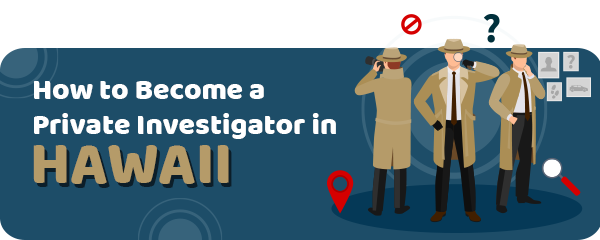There are many benefits to becoming a private investigator in Hawaii.
If you want to learn more about this exciting career path, read the article below for details and info.
Article Table of Contents
Private Investigator Requirements and Responsibilities in Hawaii
In Hawaii, the Board of Private Detectives and Guards oversees the practice of private investigations.
To become registered or licensed as a private investigator in Hawaii, all applicants must satisfy the following minimum criteria:
Earn your accredited, affordable private investigation career diploma online with Penn Foster!
Popular Programs
- Be at least 18 years old
- Have no psychological or psychiatric conditions
- Have no convictions for crimes
- Demonstrate a positive personal and financial history
Private Investigator Training in Hawaii
In Hawaii, to attend private investigator school, you’re required to have completed high school or its equivalent.
Additionally, you must have four years of full-time work experience in any of the following roles to establish your own practice:
- Police officer
- Investigator employed by any level of government (federal, state, county, or city)
- Investigator employed by an attorney or law firm
- Private investigator working under the supervision of a licensed private detective
If you possess equivalent military certification classes or training, the Department of Commerce and Consumer Affairs may recognize it as meeting the certification standards for private detectives.
The Hawaii Board of Professional and Vocational Licensing requires training in the following areas:
- Hawaii’s laws and ethics
- Interview techniques
- Investigation strategies
- Surveillance techniques
- Handling and collecting evidence
- Privacy regulations
- Background checks
- CPR
There are numerous campus locations and online schools throughout Hawaii offering certificate and degree programs.
These are for subjects pertinent to private investigation, such as:
- Criminal Justice
- Crime Scene Investigation
- Law
- Criminal Psychology
- Law Enforcement
Let’s have a look at where you can get trained as a private investigator in Hawaii.
Chaminade University of Honolulu 
This school is accredited by WASC Senior College and University Commission.
Upon finishing the Criminology and Criminal Justice minor, students will be able to:
- Explain the interconnected institutions and operations of the criminal justice system,
- Comprehend the fundamental rights ensured to individuals by state and federal laws and constitutions
- Demonstrate proficiency in qualitative and quantitative research techniques,
- Use a range of social science methods to investigate specific criminological inquiries.
To enroll in the program, you need to:
- Complete either CJ 151 Criminal Justice Systems or CJ 201 Foundations in Criminology.
- Take CJ 315 Behavioral Sciences Statistics.
- Complete at least 12 more hours of upper-division Criminology and Criminal Justice courses.
- Maintain a cumulative grade point average of 2.0 or higher.
Hawaii Pacific University 
This school is located in Honolulu, which makes it easier to reach.
Hawai‘i Pacific University offers the Associate of Science degree in Criminal Justice to students within the College of Professional Studies.
To enroll, you need to finish 60 credit hours of courses at the lower-division level (1000- and/or 2000-level).
This AS in Criminal Justice transitions into the Bachelor of Science in Criminal Justice program.
Alongside traditional classroom instruction, HPU offers the AS in Criminal Justice degree program online.
Upon completion of the Associate of Science in Criminal Justice, students will understand the functions and operations of the primary components of the criminal justice system:
- Law enforcement,
- Courts,
- Corrections.
Enhance oral and written communication skills to effectively convey analysis of criminal justice research and propose solutions to various contemporary criminal justice issues.
| School Name | Address |
|---|---|
| Chaminade University of Honolulu | 3140 Waialae Ave, Honolulu, HI 96816, |
| Hawaii Pacific University | 1 Aloha Tower Dr, Honolulu, HI 96813 |
Earn your accredited, affordable private investigation career diploma online with Penn Foster!
Becoming Licensed as a Private Investigator in Hawaii
After you complete the training program of your choice, you can take the exam and apply for certification.
When applying for a Hawaii private investigator license, you will need to pay either $81 or $117.
This depends on whether it’s a renewal and when you submit your application.
Additionally, there’s a $17 fee for fingerprinting.
To apply for a Hawaii private investigator license, you will need to send:
- The application form
- Proof of meeting the minimum education requirement (high school diploma or GED)
- A fingerprint card
- A certificate confirming completion of training experience
Private investigators in Hawaii should also finish four hours of continuing education to renew their certification.
Salaries for Private Investigators in Hawaii
On a national scale, private investigators typically earn an average annual income of $50,902.
In Hawaii, these dedicated professionals earn an average of $53,402 per year.
Keep in mind that your salary may vary depending on your training and location.
Typically, larger cities offer better career opportunities for PIs in this state.
For a detailed breakdown of cities offering higher salaries, refer to the following table.
Annual Salary Range:| Location | Avg. Annual Salary |
|---|---|
| Ewa Beach | $53,102 |
| Kaneohe | $53,102 |
| Pearl City | $53,102 |
| Waipahu | $53,102 |
| Aiea | $53,102 |
| Honolulu | $53,102 |
| Mililani | $53,002 |
| Kunia | $52,902 |
| Lawai | $52,802 |
| Kula | $52,802 |
Regional Salary in Hawaii
| Region | Employed | Avg. Annual Salary | Avg. Hourly Pay | Top 10% Annual Salary | Bottom 10% Annual Salary |
|---|---|---|---|---|---|
| Urban Honolulu, HI | 40 | $71,300 | $34.28 | $136,280 | $40,880 |
* Employment conditions in your area may vary.
Frequently Asked Questions
What are some of the skills needed by PIs in Hawaii?
These skills are some of the most important for a private investigator:
- Agility
- Attention to details
- Physical strength
- Discipline
- Knowledgable of laws and regulations
- Able to drive
- Comfortable approaching people
- Able to use technology and databases
Where do private investigators work in Hawaii?
Private investigators work for:
- Private investigation and detective agencies
- As independent contractors
Independent PIs work for:
- Law firms,
- Financial institutions,
- Insurance companies,
- Corporations,
- Government agencies,
- Police departments
Do all PIs in Hawaii need a license?
The short answer is “yes.”
Read the full guide: How to Become a Private Investigator


